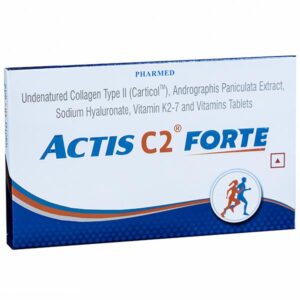ANDROGRAPHIS PANICULATA + VITAMIN K2-7 (MENAQUINONE-7) + UNDENATURED COLLAGEN TYPE II
Andrographis Paniculata: Andrographis Paniculata is a medicinal plant commonly known as “King of Bitters” or “Indian echinacea.” It has been traditionally used in Ayurvedic and Chinese medicine for its numerous health benefits.
This herb is primarily used for its immune-supporting properties and is often used to prevent and treat respiratory infections, such as colds, flu, and bronchitis. It is believed to enhance the body’s natural defense mechanisms and reduce the severity and duration of these infections. Andrographis Paniculata is also used for its anti-inflammatory, antioxidant, and antimicrobial effects.
The main active compounds in Andrographis Paniculata are andrographolides, which are responsible for its medicinal properties. These compounds modulate various immune responses, inhibit the growth of harmful microorganisms, reduce inflammation, and scavenge free radicals.
The recommended dose of Andrographis Paniculata extract varies depending on the specific formulation and the condition being treated. Typical doses range from 300mg to 600mg per day. It is usually taken orally as a capsule, tablet, or liquid extract. It is generally advisable to follow the instructions provided by the manufacturer or consult a healthcare professional for the appropriate dosage.
Common side effects of Andrographis Paniculata may include gastrointestinal symptoms such as stomach upset, diarrhea, and loss of appetite. Some individuals may also experience headache or allergic reactions, although these are relatively rare. Pregnant or breastfeeding women, as well as individuals with autoimmune disorders or bleeding disorders, should exercise caution and consult a healthcare professional before using this herb.
It is important to note that Andrographis Paniculata is not a substitute for appropriate medical care, and its use should be discussed with a healthcare professional to ensure safe and effective treatment.
Vitamin K2-7 (menaquinone-7): Vitamin K2-7, also known as menaquinone-7, is a form of vitamin K that plays a crucial role in the regulation of calcium metabolism and bone health. Unlike vitamin K1, which is primarily involved in blood clotting, vitamin K2-7 has a specific affinity for tissues that calcify, such as bones and arteries.
The primary use of vitamin K2-7 is to support bone health and prevent osteoporosis. It helps in the activation of osteocalcin, a protein responsible for binding calcium to the bone matrix, thus promoting bone mineralization. Vitamin K2-7 also inhibits the activity of osteoclasts, cells that break down bone tissue, which further helps in maintaining bone density.
The mechanism of action of vitamin K2-7 involves the activation of specific proteins, known as carboxylases, that play a vital role in calcium utilization within the body. These carboxylases depend on vitamin K for their activation, and without adequate vitamin K2-7, these proteins cannot function properly.
The recommended dose of vitamin K2-7 varies depending on the individual’s age and specific health conditions. Generally, doses between 45-185 mcg per day are considered safe and effective. However, it is always advisable to consult a healthcare professional for personalized dosage recommendations.
Vitamin K2-7 is generally well-tolerated, and adverse side effects are rare. However, in some cases, high doses of vitamin K2-7 may lead to transient symptoms such as flushing and gastrointestinal discomfort. Additionally, individuals taking oral anticoagulant medications should exercise caution and consult a healthcare professional before taking vitamin K2-7, as it can interfere with the blood-thinning effects of these drugs.
Overall, vitamin K2-7 is a valuable nutrient that supports bone health and plays a vital role in calcium utilization. It is a safe and effective supplement when used appropriately, but it is important to follow recommended dosage guidelines and consult a healthcare professional when necessary.
Undenatured Collagen Type Ii: Undenatured Collagen Type II, also known as UC-II, is a dietary supplement used for the relief of joint pain and inflammation associated with osteoarthritis. It is made from a natural source, chicken sternum cartilage.
The mechanism of action of UC-II is related to its ability to promote joint health by modulating the body’s immune response. UC-II contains a specific type of collagen, known as undenatured type II collagen, that is processed in a way to preserve its native structure. When taken orally, UC-II interacts with the immune cells in the gut, which helps to educate the immune system to differentiate between harmful and harmless substances, such as cartilage proteins. This process reduces or prevents the immune system from attacking the body’s own joint tissues, thus reducing joint inflammation and pain.
The recommended dose of UC-II is typically 40 mg once daily, taken with a meal. It is important to follow the instructions on the product label or as prescribed by a healthcare professional.
Overall, UC-II is generally considered safe and well-tolerated. However, like any supplement or medication, it may cause certain side effects in some individuals. Common side effects of UC-II may include digestive issues such as diarrhea, nausea, stomach cramps, or bloating. These side effects are usually mild and transient. In rare cases, allergic reactions may occur, characterized by symptoms such as itching, rash, or swelling. If any severe or persistent side effects occur, it is important to consult a healthcare professional.
It is important to note that UC-II is not intended to diagnose, treat, cure, or prevent any disease. It is always recommended to consult with a healthcare professional before starting any new dietary supplement or medication, especially if you have any underlying medical conditions or are taking other medications.

